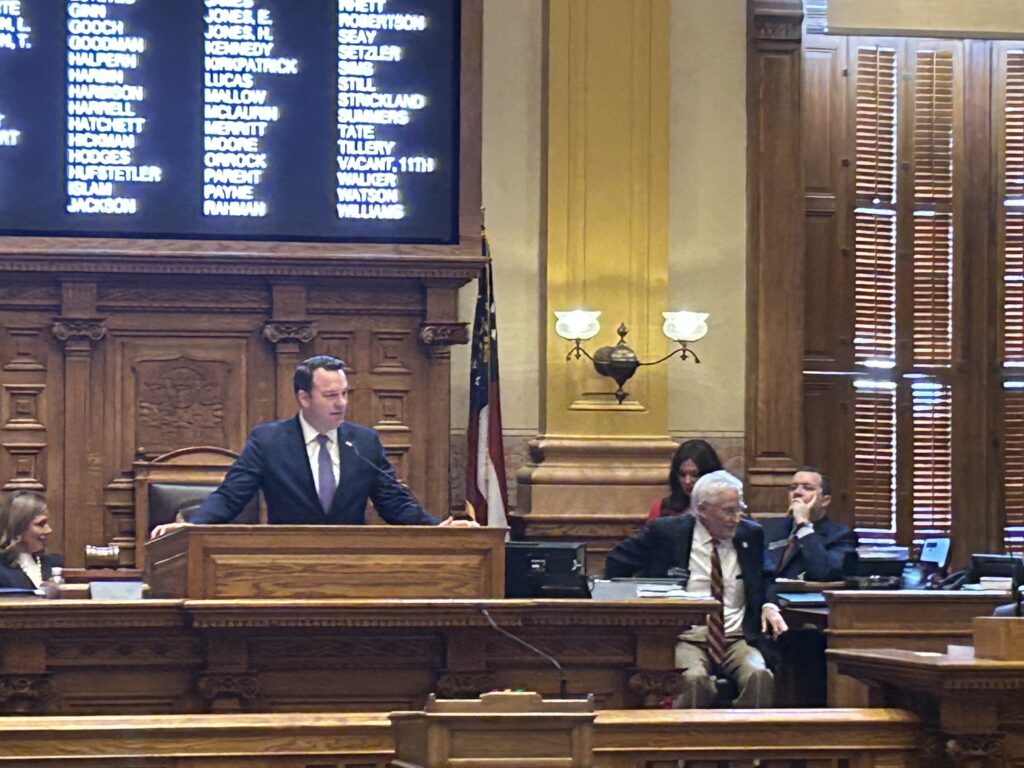
ATLANTA – With less than two weeks remaining in this year’s General Assembly session, Lt. Gov. Burt Jones has morphed from a lighting-rod political figure to a de facto life coach for anxious lawmakers.
“Everything’s gonna be alright” is the advice Republican Jones is handing out as the legislative session hits the final stretch.
As lieutenant governor, Jones presides over the state Senate, wielding his heavy gavel from the dais overlooking the chamber where he spent a decade as a senator representing Jackson and central Georgia.
“I don’t think there’s one piece of legislation out there that the state of the Republic depends on — other than the budget,” the new lieutenant governor said of his approach to the frenetic final days of the session.
Speaking of the budget, Jones is pleased about across-the-board $2,000 pay raises for state employees as well a property tax rebate drawn from Georgia’s historic budget surplus.
And he’s applying his equanimous approach to a sports betting measure making its way through the legislature.
It’s a proposal Jones supports personally but, even if it doesn’t pass, “the following day will still come,” he said.
Sports betting — after appearing to have died prior to the all-important “Crossover Day” deadline earlier this month– may have gained new life this week when it was tacked onto an unrelated bill about soap box derbies.
Jones said he thought it was wise for the legislature to consider sports betting apart from other gambling measures.
“History has shown that when you either put sports betting and casinos or sports betting and horse racing together, they usually don’t go anywhere,” he said.
“I had told people in the [Republican] caucus who were interested in sports betting that it would get a fair look, and so we’re gonna see how it does by itself.”
Jones contends that sports betting proceeds could help increase state revenues for the HOPE scholarship and help pay for expanded offerings such as scholarships for technical schools and early childhood learning.
“I think you’re going to need to pick up additional revenue streams [for those programs], and this one is legal in 36 other states,” he said.
Jones also would like to see a school vouchers measure pass. The bill would provide Georgia students in low-performing schools with $6,000 scholarships to pay for private school or certain other educational costs.
“If we can get final passage, that will be a big win for us,” Jones said.
Legislative Democrats have criticized the bill for diverting money from the public school system and noted that the scholarship amount is insufficient to cover the full cost of private-school tuition.
“Six thousand dollars could be the difference between closing the gap for those families that would like to have another option,” Jones said in response to that concern. “I think it’s a good first step.”
A vouchers bill passed by the Senate is slated to be taken up by a House committee. If approved, it could be sent to the full House for a floor vote.
“I’ve seen school voucher bills fail in the Senate. I’ve seen them fail in the House, and I’ve seen them pass both chambers,” Jones said. “But there’s never been a time when they were successful in passing both chambers, so we’ll just have to wait and see.”
Jones is also optimistic about prospects for this year’s mental health bill.
After the bill breezed through the state House of Representatives, Sen. Kay Kirkpatrick, R-Marietta, has announced that the Senate Health and Human Services Committee will consider a modified version of the bill in a case of inter-chamber wrangling.
“There’s a lot of subject matter there to tackle, a lot of moving parts,” Jones said. “We’re trying to get to a place where we’ll have something both chambers can agree on.”
Far more controversial is a bill that would prohibit transgender youths in Georgia from receiving either hormone-replacement therapy or gender-affirming surgery even if their parents and doctors approve.
“I don’t think we need to make it OK for something as drastic as trying to either through medication or surgical procedures …. do permanent changes to a child that could have significant long-term effects in a negative way,” Jones said.
The lieutenant governor said he is not concerned the controversial measure could damage Georgia’s reputation with large businesses.
“I haven’t heard from the business community at all on this,” he said. “There will be things we do that the business community doesn’t like … but in most cases, it’s not the majority.”
This story is available through a news partnership with Capitol Beat News Service, a project of the Georgia Press Educational Foundation.
